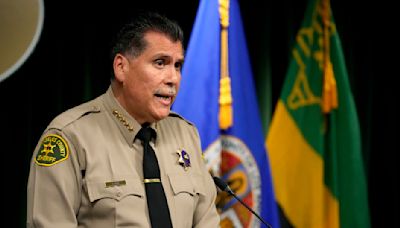 A new civilian oversight commission’s report released on Friday says at least a half-dozen deputy gangs are still operating inside the Los Angeles County Sheriff’s Department.
A new civilian oversight commission’s report released on Friday says at least a half-dozen deputy gangs are still operating inside the Los Angeles County Sheriff’s Department.
The report called on newly-elected Sheriff Robert Luna to eliminate them.
The report stated: “The Recommendations provide an immediate call to action to the Sheriff, the Department leadership and every member of the Department. There can be no more delays!”
Sheriff Robert Luna said in a statement Friday that he was elected in November to “bring new leadership and accountability to this Department” and thanked the commission for its work but stopped short of committing to immediately ban the cliques.
“The vast majority of the Department personnel are hardworking and dedicated professionals who are committed to humbly serving the community,” Luna said. “We look forward to working with the Civilian Oversight Commission and Inspector General on this in the future.”
(News Report last Year)
To Read the Entire Report, Click Here: Sheriff’s Gangs
The Special Counsel’s report to the Sheriff Civilian Oversight Commission details numerous accounts of deputy gangs and deputy cliques “engaging in harmful, dangerous, and often illegal, behavior” within Men’s Central Jail and several Sheriff’s stations.
The report named several gangs, including the Executioners, the Banditos, the Regulators, the Spartans, the Gladiators, the Cowboys and the Reapers.
Here are excerpts from the report:
- The origins of Deputy Gangs and Cliques within the Department date back decades. They may have started with benign intentions, but history has proved that Deputy Cliques have often evolved into Deputy Gangs.
- The deputy members use gang-like symbols and engage in gang-type and criminal behavior directed against the public and other Department members.
- As part of the investigation, the report states that the Special Counsel interviewed approximately eighty witnesses.
- The witnesses were current and former Deputies, Sergeants, Lieutenants, Captains, Commanders, Assistant Sheriffs, and Undersheriffs; a former Sheriff; and former law enforcement officials from other law enforcement agencies.
- Many witnesses were interviewed multiple times.
- Deputy Cliques run the stations or units where they exist, as opposed to the sergeants, lieutenants, and the captain who are charged with the duty to run the station; exercise influence over, and often decide assignments and shifts, training, and overtime
- The gangs exclude deputies from the Deputy Cliques, often based on race, 11 ethnicities, or gender; intimidate deputies that are not part of the Deputy Cliques.
- The deputy gangs give orders not to provide backup to disfavored deputies or not members of the Deputy Cliques.
- They order work slowdowns if the management of a station attempts to rein them in.
- The deputy gangs encourage a “we-they” attitude, not just between them and the public but with other deputies within the station.
- They operate in secrecy, lie in reports to protect each other; and threaten the public with the use of excessive force without justification.
- They belittle deputies unwilling to engage in such acts.
- Most troubling, they create rituals that valorize violence, such as recording all deputy-involved shootings in an official book, celebrating with “shooting parties,” and authorizing deputies who have shot a community member to add embellishments to their common gang tattoos.
In two separate shootings of community members Sheldon Lockett and Donta Taylor, the report stated that Deputy Aldama, and his partner, Mizrain Orrego, were named as defendants.
In each instance, the deputies claimed that the victims had guns. In neither case was a gun located, and much evidence suggested that in fact, neither had guns.
The County settled both cases with the families of the deceased for a total amount just short of ten million dollars. Since outside counsel was engaged in each case substantial legal fees were incurred on top of the settlement amount, the report stated.
(July 2021 Report)

